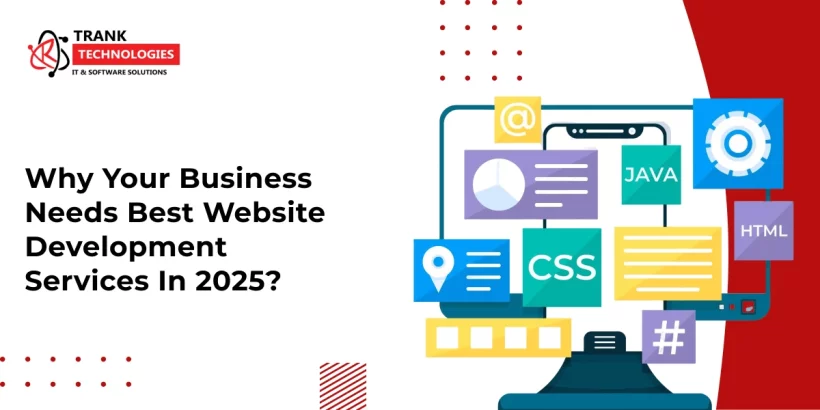
7 Common WordPress Website Security Issues & Their Preventions
Growing business with a WordPress website is indeed simple. But this seamlessness tends to disappear the moment your online portal fascinates the attention of hackers. Apart from this, your website begins to plummet in terms of performance with time making the lack of upgrades even worse. This drastic dearth of security can open the passage for malware. These WordPress website security issues can invite other harmful sources that steal customers’ info from business websites.
In this post, we will address some common WordPress business website security issues. Moreover, we will discuss the possible ways to prevent these malicious threats from violating the security foreground of your online business. First things first! Let’s take a look at the most common WordPress security issues that make you lose customers on the web:
You can also read – What Is Hybrid App Development? A Comprehensive Guide – Trank Technologies
Common WordPress Security Problems
1. Cross-Site Scripting (XSS)
Those blackhat cyberattackers use notorious ways to break into your backend system, and XSS is one of them. It denotes cross-site scripting in which hackers try to adulterate the functionality of your WordPress website by injecting corrupted coding in the backend. It occurs as a silent strike because hackers leverage user-facing forms to submit malicious code on your website.
2. Brute Force Login Attempts
This type of cyber intrusion is the simplest job for a hacker in which they use automation to enter multiple usernames and passwords in a very short span, eventually finding out the real credentials. This form of a breach is used to steal all kinds of password-protected details.
3. SQL Injections
SQL injection or database injection is analogous to an XSS attack except for the use of a contact form. Cyber attackers use the contact page of the website to fill harmful code in the user input and submit a string of malware codes. WordPress websites fetch those codes as their database and that’s how it ruins website performance.
4. Backdoor File Corruption
Backdoor files let cyber attackers bypass the WordPress login and get through your website easily. Hackers then jam your website, making it inaccessible for new users. To make it worse, they make it different variants of this coded backdoor to continue affecting your website even after frequent removal.
5. Denial of Service Attacks
DoS or denial of service attacks block all the authorized users preventing access to their website. These hackers carry out the DoS intrusion by overloading a server with heavy web traffic and inflicting a crash. It can get dire in the case of distributed denial of service.
6. Hotlinking
Hotlinking is a complex form of cyber attack as it involves the implantation of your website content or images on another website. It appears like web content stealing, but it never ends well because it is considered illegal, and it can spoil the credibility of your website on the web.
7. Phishing
A cyber attacker can disguise as a full-fledged company or service provider to accomplish the misdeed which is known as phishing. They often pose as service providers trying to persuade WordPress website owners into downloading malware and give up personal details. After this, they use the same phishing method on your website visitors.
You can also read: 10 Best SEO Plugins For WordPress E-Commerce Websites
Common WordPress Website Security Issues – Vulnerability Points Used by Hackers
Various types of security infringement result in different problems. There are several spots on your web platform that cyber attackers use again and again to enter into the system. These vulnerability points are:
Themes – WordPress theme is surprisingly a very accessible portal for attackers using which they open your site. It happens mostly when you use outdated themes or third-party themes that don’t comply with WordPress standards of security and compatibility.
Plugins – You need to be cautious while downloading plugins on your WordPress business website because third-party plugins are prone to recurring security issues and breaches. The plugins with backend access to your site pave the way for hackers to wreck your website’s structure and functionality.
Login Page – WordPress login page usually ends with wp-admin or wp-login.php in the URL. Cyber attackers use this common syntax to break into your website through a forced brute entry.
Old WordPress Versions – Most hackers ensure to keep an eye on software updates to detect security vulnerabilities on WordPress websites. Then, they try to target your business website using the older version of the platform.
You can also read – Best UI & UX Practices For Raising The Performance Of A Learning Management System
How to Prevent WordPress Website Security Issues Using Different Methods
Here’s how you can assure the security of your WordPress business website using login, hosting, and many other different methods:
Protected Login Procedure (Recommended for WordPress Website Security Issues)
- Always use strong passwords to protect your website from cyber thieves lurking in your business through numerous sources. Don’t hesitate to move beyond birthdays and anniversaries for curating your secret code and add some numbers and special characters to make it work.
- 2FA or two-factor authentication is perceived for optimal protection when you sign up on WordPress using two distinct devices.
- Stop putting ‘admin’ as the username because it is immensely outdated, and hackers use the lack of updates to attempt brute force login and wreak havoc.
- WordPress lets you limit the number of login attempts and efficiently avert brute-forcing and cross-site scripting. Simply download the login on WordPress and activate it to commence WordPress security.
- Always add a captcha code feature on your web portal to assimilate an additional layer of security in the login functionality. You can easily enable Google reCAPTCHA in your WordPress business website or look for a more streamlined plugin to do so.
- Turn the option of auto-logout on to stop unidentified users from breaking in into your website. If you can’t find an option for the same, you can always download a plugin for that.
Secure WordPress Hosting
Be as circumspective as you can while choosing hosting services for your WordPress business website to avoid common security issues and cyber attacks. Discuss whether your hosting company provides needed assistance in case a website is hacked. Their technical support policy will clarity your choice.
Regular Website Backup
Dysfunctional website performance isn’t the only aftermath of WordPress website hacking. There is a vivid chance that you will lose all the website data and never be able to retrieve it. Develop a habit of backing up your website data to stay ready for a potential cyber intrusion and not lose anything even if those attackers try to steal the data.
WordPress Update
WordPress business websites get into security breach trouble only because hackers find a way to enter the backend of the website through older versions. You must keep a check on it. Update the website every time a new version of WordPress is introduced on the dashboard. Don’t forget to backup your website before upgrading WordPress.
You can also read – Magento E-Commerce Development – Why Companies Prefer It For Creating Shopping Sites?
WordPress Security Plugins
WordPress is loaded with themes and plugins that serve a growing business efficiently. To ensure the best level of website protection, you can browse for reliable WordPress security plugins and read reviews. After finding out a credible source, download and activate on the platform for a covered security.
Final Thoughts – There are plenty of other methods and techniques to keep these common WordPress security issues at bay and experience undisrupted navigation on your business website. You can connect with Trank Technologies and talk to our web development experts for assistance on WordPress website development.







